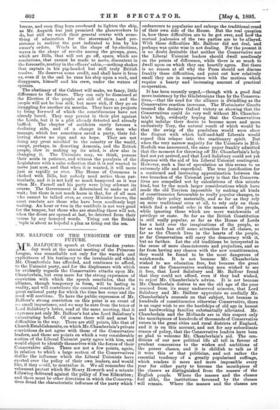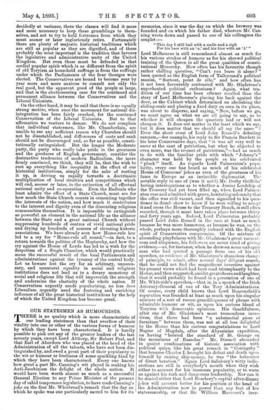MR. BALFOUR ON THE ITNIONISM OF THE FUTURE.
MR. BALFOITR'S speech at Covent Garden yester- day week at the annual meeting of the Primrose League, was remarkable not only for the warmth and explicitness of his testimony to the invaluable aid which Mr. Chamberlain has afforded, and continues to afford, to the Unionist party, and for the displeasure with which he evidently regards the Conservative attacks upon Mr. Chamberlain, but even more for the strong expression of conviction with which the speech concludes, that the alliance, though temporary in form, will be lasting in reality, and. will contribute the essential constituents of a great national party for which the time has come and the need will continue. To have the public expression of Mr. Balfour's strong conviction on this point is an event of no small importance, and we may be sure from the tenor of Lard Salisbury's letter, read at the same meeting, that it expresses not only Mr. Balfour's but also Lord Salisbury's unhesitating belief. Of course there will and must be difficulties in the way. There are still points, like that of Church Establish ments, on which Mr. Chamberlain's private convictions do not agree with those of the Conservative leaders, and these are points on which a very considerable section of the Liberal Unionist party agree with him, and would object to identify themselves with the forces of their Conservative allies. There are not a few points, again, in relation to which a large section of the Conservatives dislike the influence which the Liberal Unionists have exerted over the policy of their own leaders, and would like, if they could, to neutralise it. We all remember the vehement protest which Sir Henry Howorth and a minute following delivered against the policy of Free Education ; and there must be other directions in which the Conserva- tives dread the characteristic influence of the party which endeavours to popularise and enlarge the traditional creed of their own side of the House. But the real queffition is, how these difficulties are to be got over, and ho' i the mutual jealousies of the two parties are to be allayed. With these difficulties Mr. Balfour did not deal, and perhaps was quite wise in not dealing. For the present it is no doubt desirable that neither the Conservative nor the Liberal Unionist leaders should dwell needlessly on the points of difference, while there is so much to dwell upon on which they can heartily agree. But there is no reason at all why the Press should not discuss frankly these difficulties, and point out how relatively small they are in comparison with the motives which require a hearty and increasing amount of practical co-operation.
It has been recently urged,—though with a good deal more insistency by the Gladstonians than by the Conserva- tives,—that the need for the alliance is dwindling as the Conservative reaction increases. The Westminster Gazette treated the decisive Oxford victory as showing that the Conservatives could do very well without Mr. Chamber- lain's help, evidently hoping that the Conservatives might indulge their desire to become more and more exclusively Tory, the natural result of which would bo that the swing of the pendulum would soon show the disgust with which half-and-half Liberals would regard this relapse into the reactionary spirit. But when the very narrow majority for the Unionists in Mid- Norfolk was announced, the same paper frankly admitted that the moment for throwing off Mr. Chamberlain's help had not yet arrived, and that Lord Salisbury could not yet dispense with the aid of his Liberal Unionist contingent. However, such a line of speculation as this seems to us extremely idle and superficial. The true justification for a continued and increasing approximation between the two branches of the Unionist party is that the Conserva- tives are compelled not by calculations of this minute kind, but by the much larger considerations which have made the old Toryism impossible by making all kinds of constituencies favourable to really popular changes, to modify their policy materially, and so far as they rely on mere traditional cries at all, to rely only on those which find a cordial echo in the masses of the people, while ignoring those which are mere watchwords of privilege or caste. So far as the British Constitution is still really popular, so far as the House of Lords has a hold over the imaginations of the people, so far as rank has still some attraction for all classes, so far as the Church lives in the hearts of the people, so far Conservatism will carry the democracy with it, but no farther. Let the old traditions be interpreted in the sense of mere class-interests and prejudices, and so far from having any chance with the new constituencies, they would be found to be the most dangerous of watchwords. It is not because Mr. Chamberlain wished to see education free, but because the great mass of the Conservative working men wished to see it free, that Lord Salisbury and Mr. Balfour found that they could not afford, even if they had wished, to reject Mr. Chamberlain's advice. It is not because Mr. Chamberlain desires to see the old age of the poor rescued from its many undeserved miseries, that Lord Salisbury and Mr. Balfour appreciate so cordially Mr. Chamberlain's counsels on that subject, but because in hundreds of constituencies otherwise Conservative, there is an eager wish to see the hardships of old age in honest and hardworking families substantially alleviated. Mr. Chamberlain and the Midlands are in this respect only the mouthpieces of hundreds of thousands of Conservative voters in the great cities and rural districts of England, and it is on this account, and not for any subordinate reason of policy, that the Conservative leaders have been so glad to welcome Mr. Chamberlain's aid. The con- ditions of our new political life all tell in favour of prudent concessions to the wishes and ambitions of the poorer classes, and it is childish to talk as if it were this or that politician, and not rather the essential tendency of a greatly popularised suffrage, which renders it more and more impossible every year for either party to become the mouthpiece of the classes as distinguished from the masses of the English people. Where the masses and the classes feel alike, the institutions favoured by the classes will remain. Where the masses and the classes are decidedly at variance, there the classes will find it more and more necessary to keep these grumblings to them- selves, and not to try to hold fortresses from which they must sooner or later ingloriously retire. Fortunately there are plenty of majestic historical traditions which are still as popular as they are dignified, and of these probably the most important is the tradition that favours the legislative and administrative unity of the United Kingdom. But even these must be defended in that cordial popular spirit which is as different from the spirit of old Toryism as household suffrage is from the suffrage under which the Parliaments of the four Georges were elected. The Conservatives are bound to become year by year more and more anxious to consult not only the real good, but the apparent good of the people at large, and that is the electioneering case for the continued and permanent alliance between the Conservatives and the Liberal Unionists.
On the other hand, it may be said that there is no equally strong motive, when once the movement for national dis- integration has been fairly crushed, for the continued Conservatism of the Liberal Unionists. But to that affirmation we venture to demur. We do not complain that individual statesmen, like Mr. Chamberlain, are unable to see any sufficient reason why Churches should not be disestablished, and differences of caste and rank should not be discouraged and, so far as possible, consti- tutionally extinguished. But the longer the Moderate party, the party who really take pride in the greatness and the goodness of English government, consider the destructive tendencies of modern Radicalism, the more firmly convinced, we think, they will be, that the wish to root up everything like inequality in the effect of our historical institutions, simply for the sake of rooting it up, is driving us rapidly towards a doctrinaire multiplication of local rivalries and competitions which will end, sooner or later, in the extinction of all effectual national unity and co-operation. Even the Radicals who least admire the effect of a State Church, must see for how much the State Church counts in cementing together the interests of the nation, and how much it contributes to the interest and dignity even of the dissenting religious communities themselves. It is impossible to extinguish so powerful an element in the national life as the alliance between the State and a great national Church without suppressing hundreds of centres of vivid national pride and drying up hundreds of sources of elevating historic associations. We have already seen how Home-rule has led to a cry for "Home-rule all round,"—in fact, to a return towards the politics of the Heptarchy, and how the cry against the House of Lords has led to a wish for the despotism of a Single Chamber, which would practically mean the successful revolt of the local Parliaments and administrations against the tyranny of the central body. Let us beware lest the cry for an arbitrary, unneces- sary, and unnatural equality in social and religious institutions does not lead us to a dreary monotony of social and religious life that will impoverish the strength and undermine the elasticity of the whole nation. If Conservatism urgently needs popularising, no less does Liberalism urgently need the fostering and enriching influence of all the great historical institutions by the help of which the United Kingdom has become great.







































 Previous page
Previous page